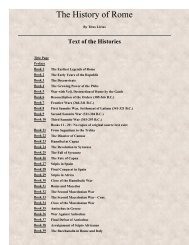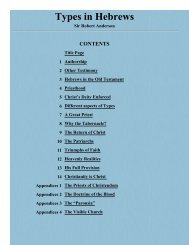The Person of the Holy Spirit - Table of Contents
The Person of the Holy Spirit - Table of Contents
The Person of the Holy Spirit - Table of Contents
You also want an ePaper? Increase the reach of your titles
YUMPU automatically turns print PDFs into web optimized ePapers that Google loves.
<strong>The</strong> <strong>Person</strong> <strong>of</strong> <strong>the</strong> <strong>Holy</strong> <strong>Spirit</strong><br />
by John F. Walvoord<br />
Chapter 4<br />
<strong>The</strong> <strong>Holy</strong> <strong>Spirit</strong> in Relation to <strong>the</strong> <strong>Person</strong> and Work <strong>of</strong> Christ<br />
(Continued from <strong>the</strong> October-December Number, 1940)<br />
Introduction.<br />
To <strong>the</strong> careful interpreter <strong>of</strong> <strong>the</strong> Scriptures, no portion <strong>of</strong> <strong>the</strong> Word <strong>of</strong> God requires more careful exegesis than <strong>the</strong> Gospel<br />
narratives. Combining in <strong>the</strong>ir scope <strong>the</strong> elements <strong>of</strong> three dispensations, Law, Grace, and Kingdom, <strong>the</strong> problems <strong>of</strong><br />
interpretation are multiplied, yet <strong>the</strong> accounts are so simple in statement that a child may read with pr<strong>of</strong>it. Christ lived in <strong>the</strong><br />
days <strong>of</strong> <strong>the</strong> setting sun <strong>of</strong> Mosaic law. Its provisions had ruled Israel for fifteen hundred years, more frequently disobeyed<br />
than obeyed, equally misinterpreted by <strong>the</strong> literal Pharisee and <strong>the</strong> liberal Sadducee. It had been intended as a schoolmaster<br />
to bring Israel to Christ (Gal 3:24), but its pupils had not learned <strong>the</strong>ir lessons. Christ came to fulfill <strong>the</strong> law, not only in His<br />
death on <strong>the</strong> cross, but in His own life to demonstrate perfect obedience. He was “made under <strong>the</strong> law” (Gal 4:4).<br />
Repeatedly in His messages, Christ referred to and interpreted <strong>the</strong> law, correcting <strong>the</strong> interpretations which had abused it,<br />
and adding new concepts <strong>of</strong> God and truth. Even as Christ had a backward look at times to <strong>the</strong> law, so also His prophetic<br />
message anticipated <strong>the</strong> coming glorious kingdom. He teaches <strong>the</strong> people <strong>the</strong> principles <strong>of</strong> <strong>the</strong> kingdom, warns <strong>of</strong> <strong>the</strong> danger<br />
<strong>of</strong> exclusion, raises a l<strong>of</strong>ty standard which pierced through <strong>the</strong> outward forms <strong>of</strong> religion to matters <strong>of</strong> <strong>the</strong> heart. His<br />
Messianic message is presented with all <strong>the</strong> clarity and revelation which could be expected from His lips. As <strong>the</strong> growing<br />
unbelief <strong>of</strong> <strong>the</strong> people indicates <strong>the</strong>ir rejection and brings <strong>the</strong> shadow <strong>of</strong> <strong>the</strong> cross nearer, Christ turned to truth concerning<br />
<strong>the</strong> present age, <strong>the</strong> kingdom not in its outward display, but in its mystery form. <strong>The</strong> fulfillment <strong>of</strong> <strong>the</strong> promise <strong>of</strong> God to<br />
David is postponed, and into <strong>the</strong> foreground comes <strong>the</strong> undeclared purpose <strong>of</strong> God to call out from every nation a new<br />
company, composed <strong>of</strong> both Jew and Gentile, independent <strong>of</strong> all His promises to Israel, having its own calling and destiny.<br />
Only by bearing in mind that Christ lived in His prophetic ministry in <strong>the</strong> three dispensations <strong>of</strong> Law, Grace, and Kingdom<br />
is it possible to exegete with accuracy and pr<strong>of</strong>it <strong>the</strong> Gospel narratives which contain extended reference to all three systems<br />
<strong>of</strong> truth.<br />
Aside from <strong>the</strong> intricate nature <strong>of</strong> <strong>the</strong> prophetic truth revealed by Christ, a fur<strong>the</strong>r amazing event is enacted by God<br />
becoming incarnate, assuming human form, and living for a time within <strong>the</strong> limitations <strong>of</strong> <strong>the</strong> human frame. Culminating in<br />
<strong>the</strong> death and resurrection <strong>of</strong> Christ, <strong>the</strong> pages <strong>of</strong> <strong>the</strong> Gospel portray <strong>the</strong> most magnificent revelation, have reference to every<br />
important line <strong>of</strong> truth, and furnish a field <strong>of</strong> study which has been explored ra<strong>the</strong>r than mined for its treasures. It is not<br />
without point that <strong>the</strong> Old Testament so largely anticipates and looks forward to <strong>the</strong> coming <strong>of</strong> <strong>the</strong> Messiah, and <strong>the</strong> New<br />
Testament, after John, looks back to <strong>the</strong> work <strong>of</strong> Christ and gives itself to <strong>the</strong> task <strong>of</strong> interpreting what He did and what He<br />
is yet to do.<br />
<strong>The</strong> period <strong>of</strong> time spanned by <strong>the</strong> Gospels is largely in <strong>the</strong> dispensation <strong>of</strong> <strong>the</strong> law, at least up to <strong>the</strong> death <strong>of</strong> Christ, and<br />
after this event fulfilling <strong>the</strong> law, <strong>the</strong> period <strong>of</strong> transition properly begins. Of primary interest is <strong>the</strong> relation <strong>of</strong> <strong>the</strong> <strong>Holy</strong><br />
<strong>Spirit</strong> to Christ during His life on earth. Little that is new is found in <strong>the</strong> relation <strong>of</strong> <strong>the</strong> <strong>Holy</strong> <strong>Spirit</strong> to o<strong>the</strong>r men.<br />
<strong>The</strong> period <strong>of</strong> <strong>the</strong> Gospels is <strong>of</strong> special interest in <strong>the</strong> study <strong>of</strong> <strong>the</strong> doctrine <strong>of</strong> <strong>the</strong> <strong>Holy</strong> <strong>Spirit</strong> because <strong>the</strong> work <strong>of</strong> <strong>the</strong> <strong>Spirit</strong> is<br />
Messianic in every dispensation to a large degree. In <strong>the</strong> Old Testament, prophecy abounds on <strong>the</strong> <strong>the</strong>me <strong>of</strong> <strong>the</strong> Messiah and<br />
<strong>of</strong> <strong>the</strong> work <strong>of</strong> <strong>the</strong> <strong>Holy</strong> <strong>Spirit</strong> in relation to Him. Much <strong>of</strong> this is in reference to <strong>the</strong> millennium, but some is more general.<br />
Notable passages are Isaiah 11:2-3, speaking <strong>of</strong> <strong>the</strong> fact that <strong>the</strong> <strong>Spirit</strong> would rest on Christ; Isaiah 42:1-4, quoted as fulfilled








